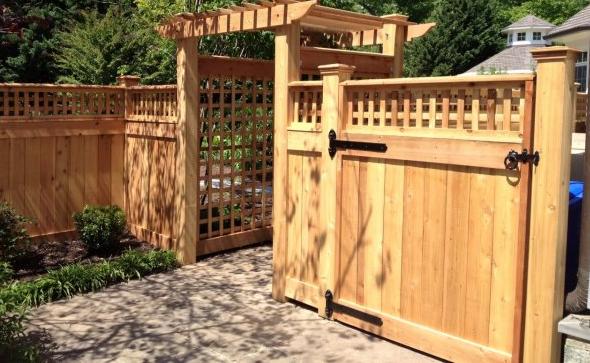All Categories
Featured

Selecting the appropriate fence for both personal privacy and sound reduction is an important factor to consider for many homeowners, specifically if you live in a busy location or near high-traffic roads. The materials you choose can make a significant distinction in how well the fence offers its objective. Allow's check out a few of the best fencing materials for enhancing personal privacy and obstructing out noise.
- Timber Fence. Wood fencings are a timeless selection for personal privacy and sound reduction. The all-natural thickness of wood allows it to absorb sound efficiently, making it a solid choice for wetting outside noises. A solid timber fence, particularly one with very closely spaced slats or no voids, supplies considerable soundproofing. Timber likewise gives a traditional, rustic visual that mixes well with most landscapes.

Best for: House owners seeking an all-natural, ageless look and reliable sound barrier. Maintenance: Wood fencings need routine maintenance to avoid problems like splintering, rot, or warping. Routine staining or securing is important to shield the wood from the components. Sound Decrease: A solid, no-gap wood fencing can block a substantial amount of noise, specifically from neighboring web traffic or construction. 2. Plastic Secure fencing. Vinyl fencings are a modern-day option to conventional timber and supply the benefit of reduced maintenance. Plastic fencings can be set up as solid panels that are fantastic for both privacy and sound reduction. While plastic does not absorb sound in addition to timber, it still offers an efficient audio barrier, especially when installed with tight-fitting panels that prevent voids.
Best for: Homeowners trying to find an affordable, low-maintenance fencing option with a modern-day appearance. Maintenance: Vinyl fences call for marginal upkeep. Just clean them occasionally to eliminate dust or discolorations, and they'll remain looking fresh for many years. Noise Decrease: Solid vinyl fences can decrease noise, though not as effectively as wood. For better noise-blocking, select thicker, high-density plastic panels. 3. Compound Secure fencing. Compound fences, made from a blend of wood fibers and plastic, offer the very best of both globes: the all-natural appearance of timber combined with the toughness and low upkeep of vinyl. These fences are dense, which assists to soak up audio while also supplying a solid personal privacy obstacle. Compound fences can also be developed with limited panels to better decrease noise.
Best for: Home owners that desire the look of timber with much less upkeep and enhanced longevity. Upkeep: Composite fencings are really low-maintenance and only require periodic cleaning to get rid of particles. Sound Reduction: Composite fences are fairly efficient at sound reduction as a result of their thickness. They carry out similarly to timber fences and are an exceptional option for those looking for both privacy and soundproofing. 4. Stone or Brick Walls. Stone or brick fences supply premium privacy and noise decrease. The solid, hefty building and construction of rock or brick walls makes them exceptionally reliable at blocking noise, especially when they are constructed with no spaces.
Ideal for: Home owners who focus on personal privacy, protection, and sound decrease over visual appeals or expense. Upkeep: Rock or block wall surfaces are sturdy and call for marginal upkeep. It's vital to examine for any fractures or damages over time. Sound Decrease: Stone or block supplies the most effective sound reduction among all materials. They are highly effective at blocking out both high and low-frequency noise. 5. Metal Fencing with Soundproofing. While metal fencings, such as aluminum or steel, are generally not as efficient for sound reduction by themselves, they can be enhanced with soundproofing materials. Adding acoustic panels or soundproofing foam can transform a metal fencing into a superb . These fences supply a sleek, modern appearance, and the included soundproofing components can supply significant noise decrease.
Best for: Home owners who choose a contemporary aesthetic and are willing to purchase soundproofing enhancements. Maintenance: Metal fences require marginal maintenance yet may need rust prevention in specific environments. Noise Reduction: When improved with soundproofing materials, metal fences can be reliable at blocking noise. Without these additions, nevertheless, steel fencings tend to be less reliable at sound decrease contrasted to denser materials like wood or block. 6. Plant or Hedge Secure Fencing. For those who choose an all-natural option, thick bushes or shrubbery can function as a noise-dampening fence. While not a conventional fencing material, dense plants can take in noise and produce a natural obstacle against sound. While they may not obstruct sound as efficiently as a strong wall, they can help in reducing ambient sound and add a layer of privacy.
Ideal for: Home owners seeking a much more green and aesthetically pleasing choice. Maintenance: Greenery fences call for routine trimming and like maintain them dense and healthy and balanced. Sound Reduction: While not as efficient as solid fences, thick plants can assist lower sound by taking in audio, particularly when expanded largely. Final thought. When picking a fencing for personal privacy and sound reduction, products like timber, vinyl, composite, and rock are among the best alternatives. For the greatest degree of personal privacy and noise decrease, stone or brick wall surfaces are the most efficient option.
Latest Posts
Find Out Reduce Expenses on Car Maintenance with Montclare Auto Repair’s Exclusive Deals
Published May 25, 25
1 min read
Reliable Industrial Roofing Solutions by Weathercraft
Published May 24, 25
1 min read
Learn Why Chicago Drivers Prefer Montclare Auto Repair for Dependable Service and Significant Savings
Published May 23, 25
1 min read
More
Latest Posts
Find Out Reduce Expenses on Car Maintenance with Montclare Auto Repair’s Exclusive Deals
Published May 25, 25
1 min read
Reliable Industrial Roofing Solutions by Weathercraft
Published May 24, 25
1 min read
Learn Why Chicago Drivers Prefer Montclare Auto Repair for Dependable Service and Significant Savings
Published May 23, 25
1 min read